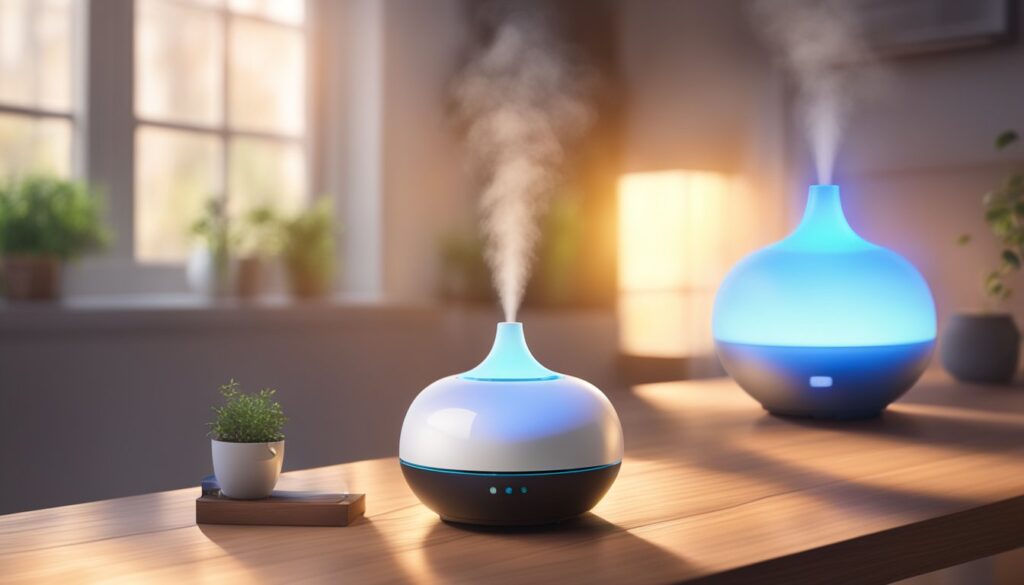Maintaining good air quality is essential for overall well-being, especially in enclosed spaces such as homes and offices. Poor air quality can lead to various health problems, including respiratory issues, allergies, and fatigue.
Diffusers and Vaporisers are popular tools that can help improve indoor air quality by adding moisture, dispersing essential oils, and eliminating harmful particles.
This article explores how these devices work, their differences, and how they can enhance the air quality in your living or working environment.
1. Diffusers: Enhancing Air with Essential Oils
Diffusers are devices designed to disperse essential oils into the air, offering numerous benefits for both air quality and overall well-being. There are different types of diffusers, such as ultrasonic, nebulizing, and evaporative, but they all share the primary function of dispersing tiny droplets of essential oils throughout a room.
How Diffusers Work
Ultrasonic diffusers, the most common type, use water to disperse essential oils into the air. They work by generating ultrasonic vibrations, which break the water and oil mixture into fine particles. These particles are then released into the air as a cool mist. Nebulizing diffusers, on the other hand, break down essential oils into even smaller particles without using water, allowing for a more potent and direct aroma.
How Diffusers Improve Air Quality
- Reduces Airborne Contaminants: Certain essential oils, such as tea tree, eucalyptus, and lavender, possess antimicrobial and antibacterial properties. When dispersed into the air, these oils can help eliminate airborne bacteria, fungi, and viruses, reducing the likelihood of infections and respiratory issues.
- Improves Humidity: Diffusers add moisture to the air, which can be especially beneficial in dry environments. Dry air can lead to irritation of the skin, throat, and nasal passages, making individuals more susceptible to colds and other respiratory problems. By introducing moisture, diffusers help maintain a healthy humidity level.
- Neutralizes Unpleasant Odors: Essential oils like lemon, peppermint, and rosemary can neutralize bad odors and purify the air. This not only makes the environment more pleasant but also removes airborne particles that may be causing the smell, enhancing overall air quality.
- Relieves Allergies: Certain essential oils are known for their anti-inflammatory and decongestant properties. For example, eucalyptus and peppermint oils can help relieve symptoms of allergies by reducing nasal congestion and soothing irritated airways.
2. Vaporizers: Moisture and Relief for Respiratory Health
Vaporizers are another effective tool for improving air quality, especially in environments where dry air is prevalent. Unlike diffusers, vaporizers primarily focus on adding moisture to the air by releasing steam. This can be beneficial for those who suffer from respiratory conditions, as well as for maintaining overall air quality.
How Vaporizers Work
Vaporizers use heat to convert water into steam, which is then released into the air. The warm mist generated by vaporizers can help increase humidity levels, especially in dry indoor environments. Some vaporizers also allow the addition of essential oils or medicated solutions to the water, providing further health benefits.
How Vaporizers Improve Air Quality
- Moisturizes Dry Air: Dry air, especially during the winter months or in air-conditioned environments, can cause discomfort such as dry skin, itchy throat, and irritated nasal passages. Vaporizers introduce moisture into the air, making it more comfortable to breathe and reducing dryness-related issues.
- Relieves Respiratory Symptoms: Vaporizers can be especially helpful for individuals suffering from colds, flu, asthma, or sinusitis. The steam produced by vaporizers helps to loosen mucus, making it easier to expel and relieving congestion. This is particularly beneficial for individuals who experience breathing difficulties due to dry air.
- Prevents the Spread of Airborne Irritants: Increased humidity from vaporizers can help reduce the spread of airborne irritants, such as dust and pollen. These particles tend to stay suspended in dry air, but with the added moisture, they are more likely to settle, reducing the risk of inhalation and subsequent irritation.
- Improves Sleep Quality: Dry air can cause snoring and discomfort during sleep due to throat and nasal dryness. By adding moisture to the air, vaporizers help to alleviate these issues, promoting better sleep quality and reducing nighttime respiratory discomfort.
3. Choosing Between Diffusers and Vaporizers
Both diffusers and vaporizers offer unique benefits for improving air quality, but the choice between the two largely depends on your specific needs.
When to Choose a Diffuser:
- You want to enjoy the therapeutic benefits of essential oils.
- You need a device that freshens the air and eliminates unpleasant odors.
- You live in an environment where air quality needs improvement without significantly altering humidity levels.
When to Choose a Vaporizer:
- You suffer from dry air and need a solution to add moisture to your environment.
- You experience respiratory issues such as asthma, allergies, or colds and need a device to help relieve congestion.
- You live in a climate with low humidity, especially during winter.
For optimal air quality, some individuals choose to use both a diffuser and a vaporizer, as they address different aspects of indoor air quality.
Understand the Difference between Diffuser and Vaporiser
Diffusers and vaporizers both play valuable roles in improving indoor air quality, but they serve different functions. Diffusers excel at dispersing essential oils into the air, neutralizing odors, and reducing airborne contaminants.
Vaporizers, on the other hand, focus on increasing humidity, which is particularly helpful in dry environments or for relieving respiratory discomfort. By understanding your specific air quality needs and choosing the appropriate device, you can create a healthier, more comfortable indoor environment.







